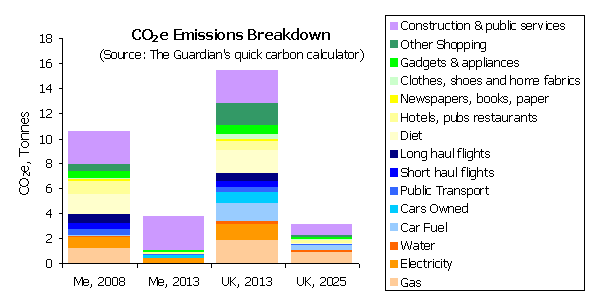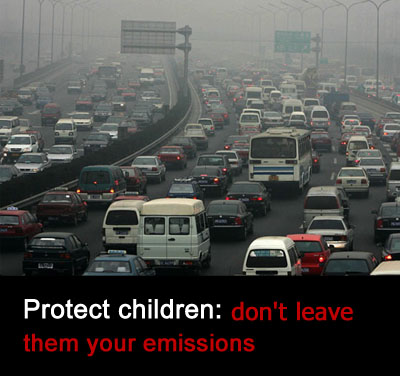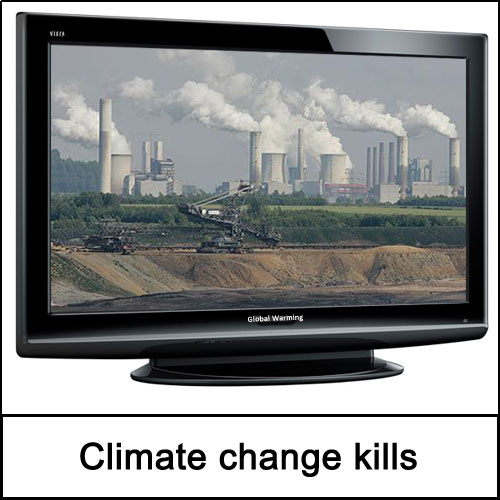by Pedro
8 February 2014
How to live sustainably
Carbon footprint calculators
Here are some carbon footprint calculators, which I found useful:
- Guardian quick carbon calculator
- Resurgence - Carbon Dioxide Calculator -more accurate for low emitters.
- Carbon Footprint Ltd. - save your results and monitor your progress.
- Carbon Independent
None of them are perfect; you may have to adjust some of your results.
According to Kevin Anderson, former director of Tyndall Climate Research, to have a fair chance of avoiding 4°C of warming (considered catastrophic by many scientists), we need to reduce our global emissions by 60% to less than 2 tonnes CO2e (carbon dioxide equivalent of all greenhouse gas emissions) per person a year. Based on my own calculations, these figures are consistent with the latest IPCC report. For consumerist nations, this requires 80% or higher reduction in emissions.
The following is a suggestion of how you could reduce your emissions to 2 tonnes. It is not a perfect solution for everyone, but should give an idea of what a 2 ton lifestyle looks like. To most people it will look drastic, but there is evidence that increased consumption is making us less happy and I have certainly been far happier and more fulfilled since I simplified my life.
If we don't cut our emissions now, no amount of consumption will compensate for the impacts we will all feel over the coming years.
When I decided to start looking at my own emissions and the potential for others to reduce their emission I looked at a few carbon footprint calculators. Whilst none of them are perfect, the results on the better calculators were fairly similar. In the end, I settled on The Guardian newspaper's quick calculator; it shows the UK average, the results are very clear and it is very quick to play around with. The following page is based on the UK average (CO2e = Carbon dioxide equivalent), but the principles apply for most people in consumerist nations.

A breakdown of emissions: My transition towards sustainability and the transition required throughout the UK
In brief - 2 ton lifestyle
- Stop flying. Save 1 ton.
- Stop driving. Save 2 tonnes.
- Turn down the heating. Put on a jumper. Save 1 ton.
- Only eat local organic food. Reduce meat to once a week. Save 1.8 tonnes.
- Buy less stuff. Save 2.5 tonnes.
- Use less electricity. Buy renewable electricity. Save 1.8 tonnes.
- Find or create more sustainable entertainment. Save 0.6 tonnes
- Stop wasting water. Save 0.15 tonnes.
- Work less and pay less tax. Save 2 tonnes
Flights
Flights are a great place to cut some emissions, with one return flight from New York to Los Angeles costing nearly two tonnes CO2e [1].
Next time you consider flying, try contemplating the following questions:
- Do you really need to make that journey at all?
- Could you tele-conference instead?
- Or find entertainment locally?
- Could you use public transport instead?
- Are the benefits of the flight worth adding to the suffering of those already afflicted with droughts, wildfires and extreme weather events?
- Is the flight worth jeopardising the food security of your children over the next 20 years?
When I was younger, I travelled cross land from Slovenia to Thailand and from southern Argentina to Mexico. Today, I couldn't justify the emissions of these journeys, but these journeys were amazing; far more interesting than flying and far more sustainable.
Save 1 ton.
Cars
For many people, giving up driving is a far greater challenge; perhaps the hardest in my list of carbon vices.
The average UK citizen spends 2 tonnes of CO2e per year on their car. Just under half of this is through the embodied energy of their car, so you can make a huge difference by getting rid of your car and joining a car share scheme or borrowing a car when you really need one. [citation required]
What about electric cars and bio-diesel? Given that half of a cars emissions over its life come from its manufacture, electric cars only reduce your emissions by half. Additionally, the extra electricity would need to come from somewhere, putting further demand on a renewables sytem that currently feeds a fraction of our demand.
I can see a place for some electric vehicles in the future, used to transport goods locally, but a society where everyone drives everywhere is incongruous with a sustainable future.
There are also other issues with driving:
- Cars make the roads more dangerous for those who choose to travel more sustainably: cyclist and pedestrians.
- Cars are socially destructive. They destroy communities and kill off local services, prevent social interaction and encourage supermarkets - which kill off variety, choice and local produce.
- Cars make people fat.
- Cars kill - Motor vehicles cause 1.2 million deaths a year worldwide [2] (Great Britain (2012): 1,754; United States (2012): 34,080 [3])
Whilst much of our infrastructure is designed around the car, for most journeys there are alternatives, such as walking, cycling or public transport.
Cycling is often perceived as dangerous, but in reality, it is no more dangerous than driving. In fact, per hour of activity, driving comes out almost twice as dangerous as cycling [4]. The more people cycling on the roads, the safer it will become for the cyclists and the more pressure for improved cycling facilities will increase.
Cycling can be a fantastic way to travel, with a freedom unrivalled by the car. You can enjoy the scenery at a leisurely rate, with unrestricted panoramic views and are no longer tied to the plans of the other passengers.
If you aren't healthy enough to cycle, you could consider an electric bicycle [5].
People often dismiss public transport, because they perceive it to be expensive and inconvenient. One reason for this perception is that people don't tend to factor in the full costs of driving: not only the fuel, but also the depreciation of the vehicle's value, repairs, tax and insurace. To make public transport more convenient, we can support existing services, which will encourage investment in more services; lobby our local government to support public transport; or provide our own services for our local community.
Next time you consider driving, try asking yourself how much you would be willing to pay to avoid the inconveniences of climate change?
Save 2 tonnes.
Heating
The quickest way to reduce your heating impact is to turn down the heating and put on a jumper. Eliminating drafts and improving loft insulation can also significantly reduce fuel use. Halve your gas bill and save one ton.
Save 1 ton.
Heating Tips - external links
For bonus points, you could further improve the insulation in your house - there are often government grants to help pay for it. You could also consider a ground source heat pump.
You could also get a wood burner, but consider where you will get your firewood from.
Bonus Points: Save 1 ton.
Food
The average Briton spends over 2.5 tonnes CO2e per year on food and going out to pubs and restaurants. Industrial agriculture is incredibly inefficient - 50 years ago, 1 calorie of fossil fuels produced 2 calories of food, now 1 calorie of food in the US requires 7 calories of fossil fuels. [6]
In an ideal, low carbon, world, we would all grow our own food on relatively small plots, perhaps using horses to produce grains and pulses, but not everyone can get access to that much land. Becoming mostly self-sufficient requires a lot of time and requires a complete life change. It takes years to learn to grow to this level and we don't have time for everyone to make this transition, even if they were willing.
Fortunately, you can cut out most of your emissions by altering your diet. If you only eat local, organic, in-season food and reduce your meat intake to once a week (preferably from a local small scale farmer), you can cut out 90% of your food emissions.
Save 1.8 tonnes.
The average Brit spends 0.7 tonnes on hotels, pubs and restaurants. Whilst this is all completely unnecessary, I do believe it is important for us to enjoy ourselves and public houses are an important social hub in communities. Why not reduce going out and have friends round for dinner more often? Or organise fun local events?
Save 0.5 tonnes.
Goods
Consumerist societies have been conned into believing that buying more crap will make them happier. However, many studies have shown that beyond meeting basic needs, money is a poor indicator of happiness. [7]
It's really easy - don't buy things you don't really need. Most of what you do need, you can buy second hand. Buy better quality stuff that will last. Learn to make do and mend.
Save 2.5 tonnes.
Electricity
Another ton or so of CO2e goes to electricity and most of this is completely unnecessary. Look at everything that consumes electricity and ask yourself if you really need it.
Our community has a 1kW solar setup and a small wind turbine, which provide all of the electricity for around 15 adults. With such limited power, everyone has to learn to share and conserve electricity or we all go without for a few days. The base load of our system is only a few watts. We only switch on what we need and only if there is enough charge in the batteries; so we have to be aware of how much power everything consumes.
Only one third of UK electricity use is due to cooking and washing. The rest of it can easily be avoided or at least reduced. Around a fifth is due to lighting - use efficient light bulbs and only switch on as many lights as you need.
Consumer electricals and computing consume another third - surely you can find something better to do with your time than sitting around watching TV and surfing the internet? How about playing music, reading a second hand book or talking to real people? Brewing alcohol, repairing your clothes or preserving fruit you have foraged?
If you have the option, buy your electricity from a company who only use renewables or perhaps consider installing solar panels. Solar panels themselves cuurently require fossil fuel energy and scarce resources in their manufacture, although there are constant advances in solar panel technology. Solar farms are also a problem because they require agricultural land. Whilst some advocates point out that sheep can graze under them, There is still much less light reaching the grass, leading to lower yields.
Save 0.6 tonnes
To most people, refrigerators and freezers are an essential, but they have only been around for the past 50 years. There are many alternatives to fridges, including buckets of water and slabs of marble. If you don't buy convenience food, there isn't much that needs refrigerating and there are plenty of ways to preserve food without a freezer. We don't have a freezer and only switch the fridge on in the summer, when we have surplus electricity. Try turning them off for bonus points!
Hand washing can also be surprisingly easy if you have the right tools. Forget getting cold and wet hands or spending hours wringing your clothes out - get a dolly and a mangle. With a little planning you can use a washing line instead of a tumble dryer for a few more bonus points!
Bonus Points: 0.6 tonnes
Water Tips - external links
Water
Stop wasting water - halve your consumption (UK average = 150 litres a day)
Save 0.15 tonnes
That's all
If you have followed the above (and you are an average Brit), you will have reduced your emissions by two-thirds! And most of these are things you can do overnight. Granted, cutting the car emissions will be harder for some people, but the rest are relatively easy.
If you can make all of these changes (even without the bonus points) then you should be well on your way to sustainability. According to many climate scientists experts, this should be low enough for us to stabilise at 2°C of warming. This is still dangerous climate change, but far better than the catastrophic climate change we are currently charging towards.
But what about the rest?
The remaining emissions are divided between heating, cooking, public transport and 'indirect emissions'.
As discussed earlier, you could potentially switch to a wood burning stove for heating and cooking. You could also consider travelling less and spending more time discovering your local area or getting involved in local activities to reduce your public transport costs.
About 25% of your emissions are beyond your control ('indirect emissions') and are caused by public sector construction and the military. As you have made so many savings on your spending, you probably no longer need to work full time - work less and pay less taxes to spend less on construction and war. I am not against taxes or public sector spending, but it needs to be completely re-addressed. Truly sustainable developments tend to cost far less anyway (as money spent is a fairly good indicator of fossil fuels burned) and provide more jobs.
Working less, you will have more time to enjoy your life and do more enjoyable things to cut your emissions further, for example gardening, foraging or crafts.
What else can I do?
Educate yourself about climate change. Understand the potential effects and the science behind climate change. Find out the truth behind climate change denial arguments. Talk to others about climate change; don't let denial go unchallenged.
Other resources
- Resilience Community Guide - Guide to building thriving, resilient communities.
- Energy Saving Trust - Advice on reducing your home's impact
- Carbon Independent - Individual action.
- Transition Network - Initiatives to rebuild resilience and reduce CO2 emissions.
- WWOOF - An opportunity to learn to grow food and to meet likeminded people.
- More links...
Lobby your government, protest, write letters and articles, jump up and down shouting about what you are doing to limit climate change. We need to do everything we can to prevent catastrophe.
Stay Happy
It is really important to stay happy. If you make yourself miserable making these changes, no-one around you will want to change and, sooner or later, you will burn out and give up. But it doesn't have to be that way - my life is much happier and far more fulfilling now. Work together with friends, make it fun, organise community events and stay happy.

About the author
Pedro (Pete Brace) graduated from university with a first class honours degree in Computer Science. He then went on to work in the video games industry for 7 years, soon earning a good salary as a Lead Game Programmer, but living an unfulfiling and unsustainable life. In the end he came to his senses and left his job to find a more sustainable life. He is now very happy living as an eco-peasant at Tinkers' Bubble fossil fuel free community in Somerset, UK, where he earns around 97% less than in his old job. [8]

Notes
1. "Kicking the Habit: Air Travel in the Time of Climate Change", Joseph Nevins, YES! Magazine, http://www.yesmagazine.org/planet/kicking-the-habit-air-travel-in-a-time-of-climate-change?utm_source=wkly20101217&utm_medium=yesemail&utm_campaign=mrNevins
2. "List of countries by traffic-related death rate", Wikipedia, http://en.wikipedia.org/wiki/List_of_countries_by_traffic-related_death_rate
3. "List of motor vehicle deaths in U.S. by year", Wikipedia, http://en.wikipedia.org/wiki/List_of_motor_vehicle_deaths_in_U.S._by_year
4. "Bike Commuter Safety", 900mpg, http://www.900mpg.org/safety.php
5. "We Simply Explain Electric Bikes", Electric Bikes Experts, http://www.electricbikesexperts.co.uk/
6. "Life Cycle-Based Sustainability Indicators for Assessment of the U.S. Food System.", Heller, Martin C., and Gregory A. Keoleian., Ann Arbor, MI: Center for Sustainable Systems, University of Michigan, 2000:42, https://www.nyu.edu/sustainability/pdf/Fossil%20Fuel%20and%20Energy%20Use%202%20FCSummit-HO-20091207.pdf
7. "Happiness and the New Simplicity: The Living Room Revolution of Community", Centre for a New American Dream, http://www.newdream.org/results/happiness-and-the-new-simplicity-the-living-room-revolution-of-community
8. The views in this article do not necessarily represent the views of other members of Tinkers' Bubble








